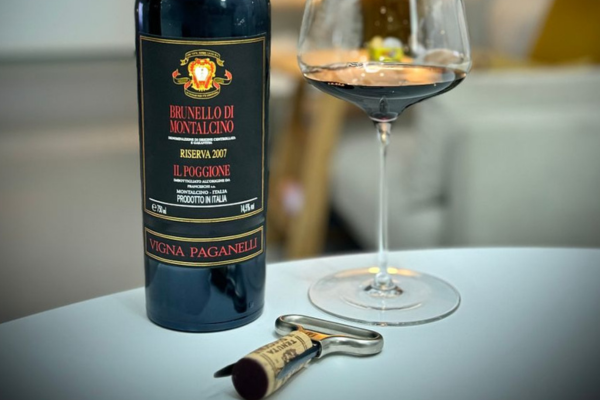July 29, 2024
Il Poggione Paganelli Vineyard: A Unique Terroir

Il Poggione, one of the oldest and most esteemed estates in Montalcino, Italy, is renowned for producing exceptional Brunello di Montalcino wines. Central to the estate’s acclaim is the illustrious Paganelli vineyard, which stands out for its unique terroir and the extraordinary quality of its grapes. This article explores what makes the Il Poggione Paganelli vineyard so special and how its distinctive terroir contributes to the excellence of its wines.
A Historical Perspective
The Il Poggione estate, founded in the late 19th century by Lavinio Franceschi, has a long history of winemaking excellence. The Paganelli vineyard, planted in 1964, is named after the Paganelli family who have been instrumental in the estate's development. This vineyard is a cornerstone of Il Poggione’s winemaking heritage and is particularly notable for producing the grapes used in the estate’s flagship Brunello di Montalcino Riserva Vigna Paganelli.
Unique Terroir
Geographic Location and Topography
The Paganelli vineyard is situated in the heart of Montalcino, a region known for its rolling hills and diverse microclimates. The vineyard is located at an elevation of approximately 150 to 400 meters above sea level, which provides a significant diurnal temperature variation. This variation is crucial for the slow and even ripening of the Sangiovese grapes, allowing them to develop complex flavours while retaining vibrant acidity.
Soil Composition
The soils in the Paganelli vineyard are predominantly composed of clay and limestone, interspersed with sand and marl. These well-draining soils are rich in minerals, which contribute to the intensity and concentration of the grapes. The limestone content, in particular, enhances the aromatic profile of the wines and imparts a distinct minerality that is a hallmark of Il Poggione’s Brunello di Montalcino.
Climate
Montalcino’s Mediterranean climate, characterized by hot, dry summers and cool, wet winters, plays a vital role in the quality of the grapes. The Paganelli vineyard benefits from ample sunlight, which is essential for achieving full ripeness, while the cool nights help preserve the grapes' acidity and freshness. The vineyard's strategic location also protects the vines from excessive winds and temperature extremes, ensuring optimal growing conditions.
Sustainable Viticulture
Il Poggione is committed to sustainable farming practices that enhance the health and vitality of their vineyards. In the Paganelli vineyard, the estate employs organic fertilization, cover cropping, and integrated pest management to maintain soil health and biodiversity. These practices not only protect the environment but also improve the quality of the grapes, ensuring that they express the true character of their terroir.
Winemaking Excellence
The grapes from the Paganelli vineyard are hand-harvested and meticulously sorted to ensure that only the highest quality fruit is used in the winemaking process. The wine undergoes fermentation in stainless steel tanks with indigenous yeasts, which preserve the natural aromas and flavours of the Sangiovese grapes. Following fermentation, the wine is aged in large French oak barrels for an extended period, allowing it to develop complexity and structure.
The Brunello di Montalcino Riserva Vigna Paganelli is a testament to the vineyard’s exceptional terroir. This wine is known for its deep colour, intense aromas of dark fruits, and notes of spice, leather, and tobacco. On the palate, it is full-bodied and elegant, with firm tannins and a balanced acidity that provides a refreshing lift. The wine’s long, persistent finish showcases the remarkable ageing potential of Sangiovese from this unique vineyard.
The Influence of Terroir on Wine Quality
The unique terroir of the Paganelli vineyard profoundly influences the quality and character of Il Poggione’s wines. The combination of elevation, soil composition, and climate creates a perfect environment for growing Sangiovese grapes that are rich in flavour and complexity. The meticulous vineyard management and sustainable practices further enhance the expression of the terroir, resulting in wines that are true reflections of their origin.
Il Poggione’s Paganelli vineyard is a shining example of the importance of terroir in winemaking. Its unique combination of geographic, climatic, and soil conditions, coupled with sustainable viticulture and meticulous winemaking, produces wines of extraordinary quality and character. The Brunello di Montalcino Riserva Vigna Paganelli, in particular, stands as a testament to the vineyard’s exceptional terroir.
